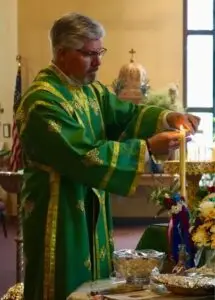Michael Kosanovich was a Special Agent for the FBI and was promoted to FBI headquarters to work International Terrorism matters just prior to the 9/11 attacks in Washington D.C. and New York. In 2003 Michael was assigned to Chicago as a Terrorism Supervisor and in 2010 was promoted to the number two position in the Chicago office as the Assistant Special Agent in Charge. Michael retired from the FBI in 2014 but continues public service in law enforcement by serving as the Deputy Inspector General at the Chicago Housing Authority.
OCPM: What was your background in ministry and/or the Church before you came to OCPM?
MK: I have four kids and they are all finally out of college. So there’s still a little noise and activity in the house, and I like that. We could probably fully retire in the next year or two, and if I am ordained a deacon in the Serbian Orthodox Church, as I would like to be, I would commit even more time to serving my parish, St. Basil of Ostrog Serbian Orthodox Church in Lake Forest, IL. There’s a Serbian iconographer in Madison, WI, and I’ve started taking his classes. Everything I do is tied to the Church somehow.
OCPM: What first sparked your passion for prison ministry?
MK: I always wanted to be in the FBI, even as a kid. When I began my career, my job was simple: investigate and arrest those who violated federal law. The result of their actions usually landed them in federal prison. Initially I felt I was doing “righteous” work, but I quickly began to feel compassion for those who, maybe through no fault of their own, and with little control over how they were raised, were overwhelmed by their environment and were led down the wrong path. One of the first guys I ever arrested was for a bank robbery. He was an alcoholic, unemployed, had a criminal record, and was living in a bad section of Detroit…and later on, I would always think about him, and others like him, knowing that the rest of their lives would be a struggle. And even recently, I found that bank robber’s name online, and his phone number. I have often thought of just calling him up.
OCPM: If you could say anything to someone considering getting more involved with prison ministry, what would you say?
MK: There are plenty of people who quite possibly could have been on a path that would have taken them to prison. There’s a fine line between those and the ones who are in prison. And the ones who have been fortunate to have good families, good upbringings, should appreciate that and understand that there are some in prison that need to be there, that made mistakes. The people I dealt with—the “bad guys” the “subjects” or whatever—I could tell who needed to be incarcerated. But there were also plenty of people who just took a bad road and didn’t have the strength or the willpower not to do bad things. If you haven’t been in prison, appreciate what you have, that God watched over you and protected you. And now there are some people in prison that weren’t as fortunate, and they need help and guidance. It’s not as black and white as “good guy, bad guy,” or “guilty, not guilty.” We should have compassion for those in prison that want human connection and are ready to change their lives. Our Faith says we should be there.

